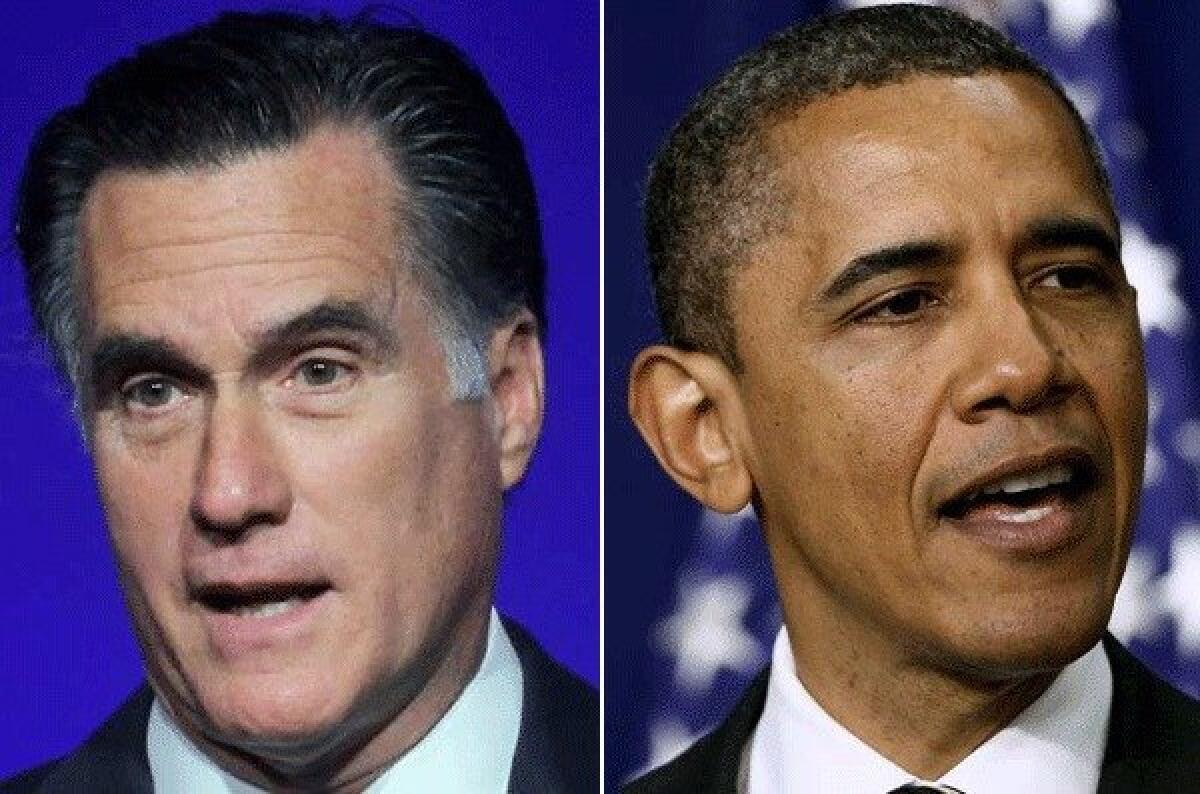McManus: Time for a presidential campaign experiment

- Share via
We got our first real glimpse this week of how President Obama and his now-almost-certain Republican rival, Mitt Romney, intend to wage their campaigns in the lead-up to the general election.
In a speech Tuesday, Obama painted Romney as an out-of-touch patrician who doesn’t care much about the troubles of hardworking people low on the income ladder. Romney soon fired back, painting Obama as an out-of-touch liberal who doesn’t care much about the struggles of honest businessmen who want to create jobs.
Obama accused Romney and his party of pursuing “social Darwinism,” of scheming to protect unscrupulous lenders from regulation. Romney accused Obama of “vilifying success” and of prolonging the recession with “an anti-business, anti-investment, anti-jobs agenda.”
Romney blamed Obama for high gas prices. Obama accused Romney of being in the pocket of “Big Oil.”
Obama accused Romney of plotting “to end Medicare as we know it.” Romney accused Obama of “taking steps that would end Medicare as we know it.”
So much for a bracing competition of ideas.
Both candidates clearly believe that the Republican primary campaign is over, and that the way to win in November is to go negative — early and often.
Until this week, Romney had to focus much of his attention on his flagging rivals for the nomination. No longer. Now, Romney wants to talk only about Obama. And Obama clearly intends to give as good as he gets.
Romney, not surprisingly, would like to make the election a referendum on Obama’s performance during his first four years. He’ll try to stay focused on the sluggish economic recovery, the swollen deficit and a healthcare law that few voters love.
The Obama campaign wants the election focused on the stark choice between two parties rather than on the record of the last four years. And that’s why the president is jumping in early to try to define Romney as ultra-conservative in the eyes of independent and undecided voters before Romney can shake off the right-wing rigors of the primary campaign and redefine himself as a moderate.
The president’s strategy is to tie Romney to some of the nation’s most unpopular Republican politicians: the tea party conservatives in the House of Representatives and their draconian budget, “a budget so far to the right it makes the Contract with America look like the New Deal.”
Romney did endorse the House GOP spending plan. “He even called it ‘marvelous,’ which is a word you don’t often hear when it comes to describing a budget,” Obama said.
But that endorsement, in Obama’s telling, meant that Romney also supported a parade of horrible consequences: less money for the FBI to fight crime, flight cancellations because of cuts in air traffic control, and no more Medicaid for middle-class children withDown’s syndrome.
What was depressing about the two men’s speeches this week was not only their hyperbolic negativity, but also how empty they were of ideas for solving the nation’s problems. Both men were passionate, but mostly about the mortal dangers of electing the other guy.
These were generic, partisan speeches designed to do one thing: energize each party’s base. Obama cast himself as the defender of the social safety net against predatory plutocrats; Romney would have us believe he’s the last line of defense against socialists determined to destroy free enterprise.
That suggests that we are heading toward a campaign that will take us right back to 2004, when then-President George W. Bush, his popularity sagging because of the war in Iraq, held off a challenge from Democrat John F. Kerry.
It was a campaign in which each party spent most of its energy trying to propel its bitterest partisans to the polls, and not much time trying to build a broader coalition that might span the center. The result in 2004 was a narrow reelection for Bush, but not much of a mandate for anything he wanted to do in his second term, as he quickly discovered in 2005, when he tried to reform Social Security and failed.
There is an alternative, though, and Obama and Romney both still have six months to try it: They could step out of their comfort zones and address issues that don’t fit so neatly into partisan talking points.
Obama could talk, for example, about how he might push his own party to get more serious about deficit reduction, including cuts in the growth of spending on Social Security and Medicare. Romney could explain which domestic programs he would cancel and which ones he would save and which tax breaks he would eliminate as part of tax reform. Rather than simply attacking Obamacare, he could propose a fleshed-out alternative.
It’s a risky course for either one, because addressing those tough issues is unlikely to draw cheers from the party faithful. But it would give the next president — whoever he turns out to be — a head start toward actually getting something done.
More to Read
Get the L.A. Times Politics newsletter
Deeply reported insights into legislation, politics and policy from Sacramento, Washington and beyond. In your inbox twice per week.
You may occasionally receive promotional content from the Los Angeles Times.











